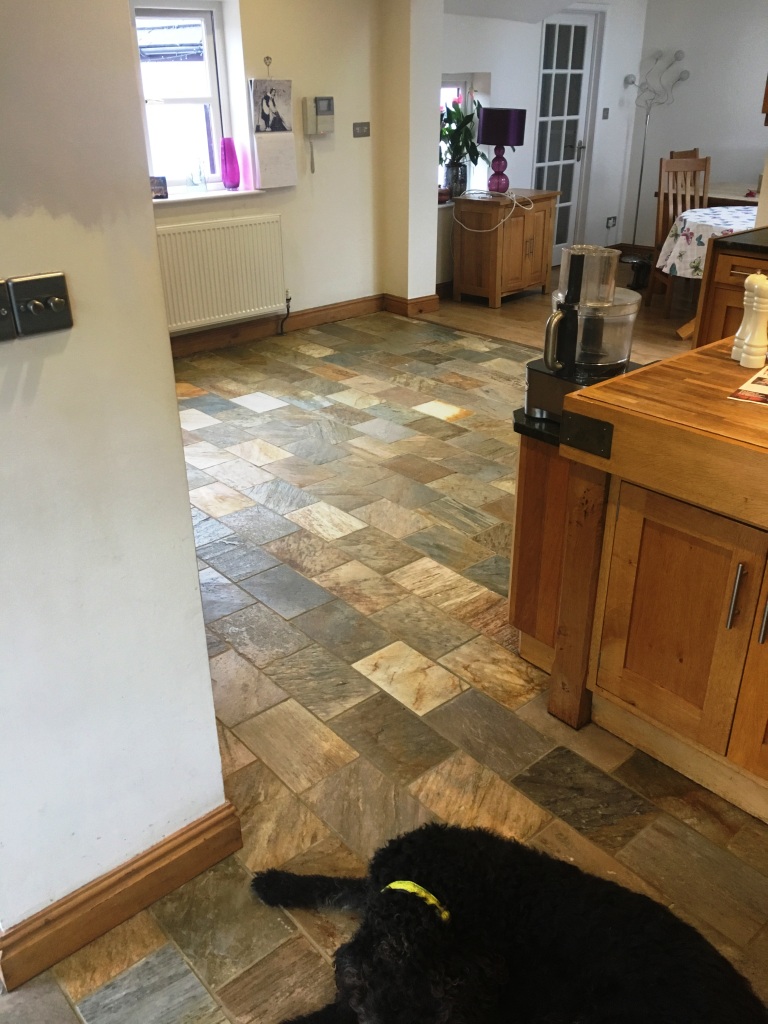This is an interesting example of a Slate tiled floor that was the unfortunate recipient of a solvent-based topical coating which had become contaminated over time which completely altered its appearance. So much so, in fact, that the new owners of the property located in the village ofGamston, had not realised that this wasn’t what the floor was actually supposed to look like!

The coating was hiding the natural beauty and character of the high mineral content Slate tiles. A previous tile cleaning company had tried and failed to remove this coating and clean the floor, having no real impact on the condition and appearance of the floor. This is because solvent-based topical floor coatings can only be removed using specialist chemical and mechanical techniques.
I knew that Tile Doctor’s range of products, combined with my knowledge of cleaning techniques, would be effective, and I was booked in to complete the job. Here’s how I did it.
Removing Solvent-Based Coatings and Cleaning a Slate Tiled Floor
To remove the solvent-based topical coating, I applied a heavy-duty coating remover from the Tile Doctor range, known as Tile Doctor Remove and Go. Remove and Go is, in fact, a highly versatile remover, formulated with a long dwell-time to strip away most coatings and sealers, epoxy grout haze, urethane coatings, synthetic finishes, adhesives and even paints.
Once applied, the product was allowed to dwell for thirty minutes. Following this, I agitated the solution with a weighted heavy-duty rotary floor machine fitted with a restorative scrubbing brush. The resulting chemical slurry was vacuumed away and the floor was rinsed thoroughly to remove suspended residues.
Next, working in sections, I forced dried the floor with an air mover and left it to dry off fully overnight so I could come back the next day and seal it.
Sealing a Slate Tiled Floor
The customer didn’t want a polished finish for the floor – instead requesting a natural look – so I opted to seal the tiles using Tile Doctor Colour Grow, which both enhances the natural shades in the stone and provides a matte finish. Colour Grow is also an impregnating sealer, meaning that it penetrates the pores of the stone to fill them with sealer thus providing maximum protection against ingrained dirt and stains.
I applied three coats of the sealer to the floor, leaving 30-45 minutes between each coat. Once dry, the floor could be walked on within 45 minutes. I advised the customer not to subject the floor to heavy use for the next 48 hours whilst the sealer cured.

The sealer provides a low maintenance finish that should last for many years if proper care is provided. To clean the floor thereafter, I recommended that my very happy client use a damp mop in combination with Tile Doctor pH Neutral Tile Cleaner. The product needs to be diluted correctly and the floor mopped using a second bucket to rinse the mop so that the suspended soils are not deposited back on to the surface of the floor.
Source: Slate Tile and Grout Cleaning and Restoration in Nottinghamshire
Sealers do breakdown over time depending on wear and tear and what products are used to clean the floor so if you do want to keep your tile and grout looking its best talk to Tile Doctor to work out a maintenance program for your tiles.